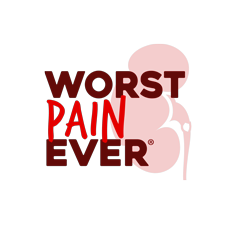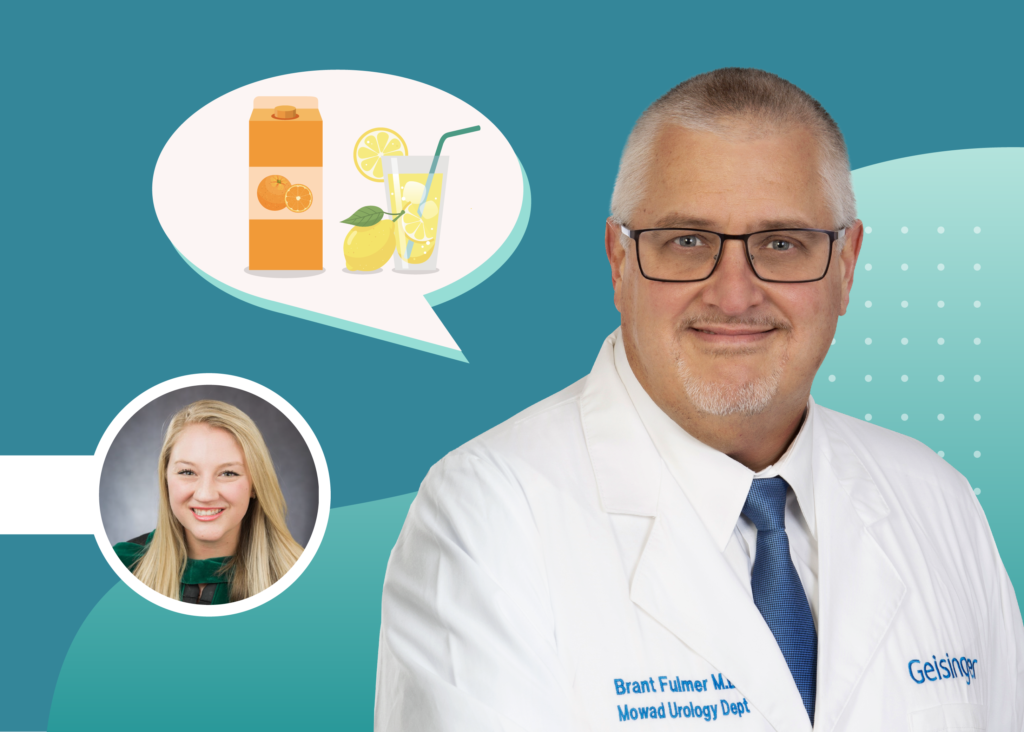Afraid to ask your urologist about supplements and home remedies for kidney stones? We got you covered. In this interview with Dr. Brant Fulmer and Dr. Rebecca Keller from Geisinger, we discuss the effectiveness of popular alternative treatments for kidney stones.
Do supplements and home remedies really help with kidney stone prevention?
Dr. Fulmer: I think there definitely are some supplements and home remedies that have a measure of benefit associated with them. Lemon juice is a very common example of a remedy that is successful for kidney stone patients with a particular metabolic abnormality. All citrus juices have citric acid, an inhibitor of stone formation. The more citric acid (or citrate) you have in your urine, the lower your likelihood of developing stones. What’s interesting is that there are other beverages that have citric acid in them for flavouring, texture or for acidity, so lemon juice isn’t the only thing that works!
Juices also have the most important ingredient: water. Patients sometimes come in and swear by cranberry juice as the thing that solved their urinary tract infection, got rid of their stone or helped their urinary tract. We have all been told for years that cranberry juice is the greatest thing! In large studies that have been done, cranberry juice has been shown to have a slight benefit, but not a statistically significant benefit. So if you drink three bottles of cranberry juice, it may be water that you drank along with the cranberry juice that cleared the infection. Similarly, when passing a small stone, it may be the increase in fluid intake that got the stone to pass and not necessarily the juice itself.
Chanca Piedra is a perfect example of a substance that has been studied and shown to decrease crystal formation. However, there’s no good evidence to suggest that it works in the body. The challenge with all supplements is that their purity and concentration is unknown. In studies done on Chanca Piedra, the challenge is that not everyone is taking the same supplement. This means that we end up having to use anecdotal evidence to determine its efficacy. Talking to your doctor about the supplements you use for kidney stones is really important to determine if the supplement poses any potential harm to you.
Is it OK to delay kidney stone treatment while waiting for supplements or home remedies to take effect? What happens if these alternative treatments don’t work?
Dr. Fulmer: I think a lot of supplements and home remedies that people talk about are actually not harmful, in and of themselves. However, we need to recognize and inform patients about the consequences of a kidney stone blocking their urinary tract.
I’ve had a patient who had pain for two years and started taking a product that had a combination of several substances in it. He shared that the pain fluctuated initially but eventually got better and he thought it was working. What really happened was that his kidney was no longer functional. With an obstruction, damage to the kidney can occur and kidney function will decrease. Another consequence of an obstruction is that an infection of the urinary tract may occur, due to bacteraemia (bacteria in your bloodstream), resulting in sepsis. Sepsis is an overwhelming infection and it can be life threatening.
It is important to get evaluated when you have pain and when you have a stone, be sure to get it either treated or confirm that you’ve passed it. Make sure that you can move on to the next step of your life without worrying about doing damage to your kidneys.
Are there any genuine, clinically proven supplements that can help to treat or prevent kidney stones?
Dr. Keller:
One of the things that we worry about with supplements is purity. A lot of supplements don’t go through the Food and Drug Administration (FDA) so they may not be regulated. There are no supplements that will prevent stones or help you pass them necessarily. Increasing your fluid intake, and taking diuretics that cause you to urinate more, may help push the stone out.
Q: With so much information online, it’s a lot harder to find reliable, accurate information. How can patients distinguish fact from opinion?
Dr. Fulmer:
I think it’s good for people to talk about information they get online. In fact, it’s not always about debunking myths! Sometimes, it helps to explain why a certain thing may or might not have the evidence to suggest it is helpful.
A strong relationship between patients and their care providers is important. You want to be able to be comfortable enough to have a conversation with your doctor about a remedy you heard. That’s critical, because a mutually respectful relationship is the basis of such conversations. When a patient brings a particular substance to me that sounds kind of crazy, and that honestly happens sometimes, I tell myself that this person really is interested in knowing, so what information can I provide? What about this substance could be considered helpful and why might it be helpful? These are the kinds of conversations that are good to have, and you need to be able to have them.
As physicians, we are aware that patients may use treatments which may not have been thoroughly examined. When patients bring a substance or remedy to me, I do a medical literature review to determine if there is any known usefulness of the treatment. Even if something hasn’t been studied, physicians can share with patients how it might potentially help or harm.
It is important to not discount patient experiences. I won’t argue with success if a patient shares that something worked for them. I’m not beyond recognizing that physicians don’t know everything.
Dr. Fulmer is a board-certified and fellowship-trained specialist in urology, subspecializing in endourology, minimally invasive surgery and robotics at the Geisinger Clinic in Danville, Pennsylvania. His clinical interests include endourology, urolithiasis/stone disease, robotic surgery, surgical therapy for BPH and endoscopic surgery.
Dr. Rebecca Keller is a fourth-year urology resident at the Geisinger Medical Center. She is planning to do a fellowship in the study of endourology, specifically into the medical and surgical management of kidney stones.





